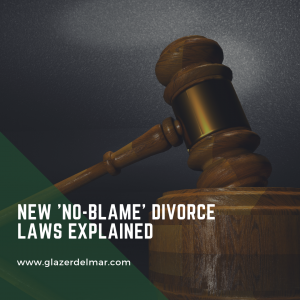The legal rights and responsibilities of parents
https://glazerdelmar.com/wp-content/uploads/2023/06/juliane-liebermann-O-RKu3Aqnsw-unsplash-1024x683.jpg 1024 683 mattd mattd https://secure.gravatar.com/avatar/854e268b6cbf4d6f0c2f99bb0d75cced?s=96&d=mm&r=gParental rights and responsibilities are a fundamental aspect of family law, outlining the legal relationship between a parent and their child, however, in some situations, a parent’s rights may be terminated due to certain circumstances.
We’ll examine the legal rights and responsibilities of parents and the issues related to termination of parental rights.
Legal Rights and Responsibilities of Parents
Parents have a range of legal rights and responsibilities towards their children, including the following:
· Physical Custody: The right to have physical custody of their child and make day-to-day decisions regarding the child’s care, including where they live and attend school.
· Legal Custody: The right to make major decisions about the child’s life, including their education, medical care, and religious upbringing.
· Visitation: The right to visit and spend time with their child.
· Financial Support: The responsibility to provide financial support to their child, including child support payments.
· Protection and Care: The responsibility to protect and care for their child’s well-being, including providing food, shelter, and clothing.
Termination of Parental Rights
In certain situations, a parent’s rights may be terminated, this is a serious legal action that permanently ends a parent’s relationship with their child and relinquishes all rights and responsibilities.
The most common reasons for terminating parental rights include:
· Abuse or Neglect: If a parent has been found to abuse or neglect their child, their parental rights may be terminated.
· Abandonment: If a parent has abandoned their child for a certain amount of time, their parental rights may be terminated.
· Failure to Support: If a parent fails to provide financial support to their child, their parental rights may be terminated.
· Criminal Conviction: If a parent has been convicted of certain crimes, their parental rights may be terminated, especially if the crimes involve violence or sexual abuse.
· Mental Illness or Substance Abuse: If a parent is unable to provide proper care and protection for their child due to mental illness or substance abuse, their parental rights may be terminated.
Termination of parental rights is a serious matter and should only be considered after careful consideration and legal advice. The process is complex and varies by location, but generally involves a court hearing and the involvement of a guardian or solicitor for the child.
Conclusion
In summary, parents have a range of legal rights and responsibilities towards their children, including physical and legal custody, visitation, financial support, and protection and care, however, in some situations, a parent’s rights may be terminated due to abuse, neglect, abandonment, failure to support, criminal conviction, or mental illness or substance abuse. Termination of parental rights is a serious legal action that should only be considered after careful consideration and legal advice.







